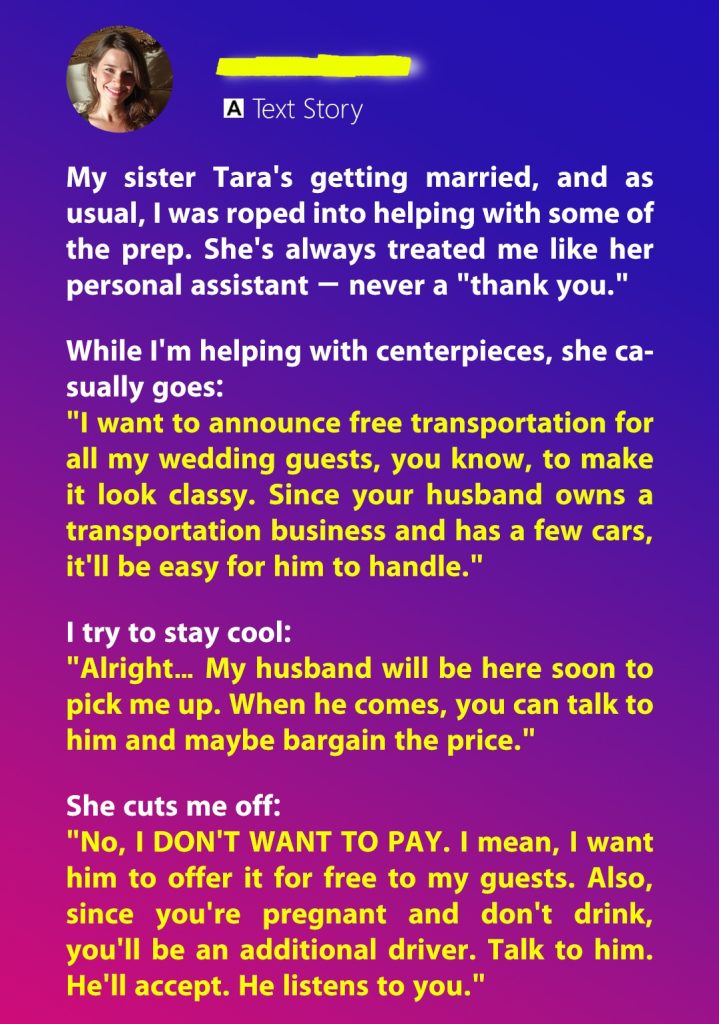I thought my sister invited me to her wedding because she loved me. The embossed card said “We can’t wait to celebrate with you,” and I pinned it to the fridge like a promise. I was eight months pregnant, moving through the world like a careful moon, and I told myself it would be good to dance a little, to be part of something bright.
The clues were there, I guess. She called the next day, bubbling about logistics: guests flying in at strange hours, a venue forty minutes outside the city, the problem of parking. “It’ll be so classy if everyone arrives smoothly,” she said. Then, lightly, “Since you’re not drinking, maybe you could… help coordinate rides? Just the night before. And the morning. And after.”
Help coordinate turned into spreadsheets. With my name on top.
By the following week, I had group chats with strangers who spoke to me like I was a paid service. “We land at 1:05 a.m.—can your car fit four?” “We want to see downtown first.” When I balked, my sister cooed, “You’re the only one I trust.” What I heard was, You’re convenient. And I was—my husband runs a small shuttle company, and I know how to keep things moving. Still, I’d imagined walking into the ceremony as a guest, not idling at curbs under hazard lights.
I tried to set a boundary: I could do airport runs the day before, nothing day-of. She sighed like I’d let air out of her dream. “It’s just family,” she said. “You’re saving us so much.” The us landed hard. Her fiancé texted me a list of pick-ups as if we’d negotiated a contract.
On the wedding morning I woke to swollen feet and a phone already vibrating. A bridesmaid needed hairspray. The groom’s cousin missed his ride. Someone typed, “Where are u??” like sirens. I told myself this would pass once the ceremony began—once we became part of the audience and not the engine.
At the venue, the coordinator waved me toward the back lot with the other “transport.” The word stung. I parked near a thicket of wildflowers and watched guests float past in linen and perfume, the kind of people who don’t check a map because they trust the world to be arranged for them. My sister—glittering, beautiful—blew me a kiss over her shoulder and mouthed, “You’re amazing.” I wanted that to be enough.

It wasn’t. During the vows, a late shuttle stranded a dozen guests at the hotel. The coordinator tugged my sleeve. “You can take the van, right?” My sister looked over her shoulder, hope sharp as a pin. I stood there, baby rolling inside me, the pastor talking about love being patient and kind, and thought: whose love?
I handed the keys back. “I’m here as her sister,” I said, not loudly, but the words felt like a door clicking shut. A cousin snorted something about pregnant hormones. I let it pass. I went back to my seat beside my husband, who slipped his hand into mine and squeezed, as if to say, You’re not a vehicle.
The ceremony finished. The sun softened. Music rose. People found cocktails and corners. My phone went silent for the first time in weeks, because I turned it off. I ate two plates of food without apologizing, cried during the first dance like everyone else, and when my sister finally reached me she was flushed and breathless. “They were stuck,” she said. “Why didn’t you—”
“Because I wanted to watch you get married,” I answered. “Because I wanted to be your guest.”
It wasn’t a fight so much as a slow dawning. She looked from my belly to my shoes and back, like recalibrating a map. Then she nodded—small, but real—and hugged me without trying to move me anywhere. Later, I heard that the hotel called a rideshare convoy; everyone arrived just fine, a little late, a little windblown, perfectly human.
When we left, the night smelled like cut grass and frosting. My sister pressed the leftover bouquet into my arms. “Next time,” she said, almost laughing at herself, “I’ll hire a driver.”
“Next time,” I said, “I’ll save a dance.” And I did, even if it was in my kitchen at midnight, barefoot, swaying with a baby who kicked along to a song only we could hear.


